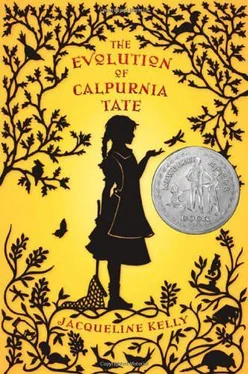Jacqueline Kelly - The Evolution of Calpurnia Tate
Здесь есть возможность читать онлайн «Jacqueline Kelly - The Evolution of Calpurnia Tate» весь текст электронной книги совершенно бесплатно (целиком полную версию без сокращений). В некоторых случаях можно слушать аудио, скачать через торрент в формате fb2 и присутствует краткое содержание. Город: New York, Год выпуска: 2009, ISBN: 2009, Издательство: Macmillan : Henry Holt and Company, Жанр: Детская проза, на английском языке. Описание произведения, (предисловие) а так же отзывы посетителей доступны на портале библиотеки ЛибКат.
- Название:The Evolution of Calpurnia Tate
- Автор:
- Издательство:Macmillan : Henry Holt and Company
- Жанр:
- Год:2009
- Город:New York
- ISBN:978-0-8050-8841-0
- Рейтинг книги:5 / 5. Голосов: 1
-
Избранное:Добавить в избранное
- Отзывы:
-
Ваша оценка:
- 100
- 1
- 2
- 3
- 4
- 5
The Evolution of Calpurnia Tate: краткое содержание, описание и аннотация
Предлагаем к чтению аннотацию, описание, краткое содержание или предисловие (зависит от того, что написал сам автор книги «The Evolution of Calpurnia Tate»). Если вы не нашли необходимую информацию о книге — напишите в комментариях, мы постараемся отыскать её.
The Evolution of Calpurnia Tate — читать онлайн бесплатно полную книгу (весь текст) целиком
Ниже представлен текст книги, разбитый по страницам. Система сохранения места последней прочитанной страницы, позволяет с удобством читать онлайн бесплатно книгу «The Evolution of Calpurnia Tate», без необходимости каждый раз заново искать на чём Вы остановились. Поставьте закладку, и сможете в любой момент перейти на страницу, на которой закончили чтение.
Интервал:
Закладка:
“I got it,” she said. “There was only three entries.”
“Yep.”
“Hmm. Still, you don’t need to be telling folks that part. Now, don’t chip nothing.”
She closed the door as she left. I admired the graceful gold-and-pink rose pattern on the translucent bone china and figured that some of the trappings of civilization weren’t so bad after all. I sipped my tea and turned back to my afternoon companions of pirates, parrots, and the sea.
Chapter 24
HARRY WOOS AGAIN
Feeble man can do much by his powers of artificial selection. . . .
COD-LIVER OIL. The grim specter of the teaspoon laden with the reeking oil suddenly leaped into my brain when I heard the wagon coming up the drive a couple of hours later, with Mother and Father and the three younger boys. If Mother thought I’d fainted due to sickness, I’d be in for it. Harry told me later that he and Fern had gone back to the fair and found our parents and told them the story. Harry stressed the smokiness of the tent in an effort to avert the deadly dosing, and this apparently did the trick. That and the fact that I ran out and met them all on the front porch looking as cheerful and lively as I could, wearing my prize ribbon, practically capering with girlish good health.
“Look, look what I won. Isn’t it exciting?” I called out, gleefully pointing at my ribbon. I wasn’t above being a big, fat imposter if it diverted attention away from a potential drenching with the world’s foulest substance.
“My goodness! A prize!” There were many exclamations of approval. Mother looked startled and pleased. She didn’t mention cod-liver oil, but she did say, “Do you feel all right, Callie? Your color’s high. Alfred, do you think we should send for Dr. Walker?”
Father said, “She looks fine to me, my dear, but if you’re worried—”
“I don’t feel sick, ma’am,” I said. “I’m excited because I won a ribbon, that’s all.”
Jim Bowie said, “How come you got a white ribbon and Travis got a blue one?”
“It’s because I’m so special, J.B.”
“Really? Gosh, Callie.”
“No, not really. I’m fooling you. A blue ribbon is lots better than a white one. Travis and Bunny won the best prize there is.” As I said this, I wondered if Mother would make me come clean about my entry, but she kept twinkling at my ribbon. Strange. Then I realized that she didn’t know. Perhaps she hadn’t noticed, or maybe she hadn’t gone by the display, or maybe Lula and Dovie had taken their pieces down before she got there. Mother looked so gratified. Did I have to be the one to tell her?
“Uh, J.B.,” I said in a loud voice, “tatting wasn’t a strong field this year.”
“Huh?”
I glanced at Mother, who was chatting with Travis.
I raised my voice. “The entrants. In the tatting class. Not so strong.”
“Wha—?”
“Anyone could have won a ribbon, J.B., is what I’m saying.”
“Why are you talking so loud? Can I have your ribbon? I never win the Firefly Prize. I’d like to have a ribbon.”
Mother didn’t look as if she’d heard me. My courage, watery and irresolute to begin with, ebbed away. I took off my so-called prize and pinned it on J.B., and he dashed away to admire himself in the hall-tree mirror. Mother started up the stairs to take off her hat.
“Ma’am, where’s Harry?” I called.
She stopped on the landing, one hand on the rail, the other reaching for her hatpin. “He’s walking Fern Spitty home,” she said. Her expression was shuttered.
“And . . . ?”
“What do you mean, and ? And nothing.”
“I wondered if . . .” I wondered if this was good news or bad, that was all. But I had no intention of meddling.
“Please don’t wonder, Calpurnia. I find it’s dangerous when you wonder.” Mother started up the stairs again. “And kindly don’t meddle.”
There she went, reading my mind again. It was scary. And me, dangerous ? That was a laugh. At least I had the answer though: Fern was good news. But if Mother thought Harry courting Fern was a good idea, what did this mean about her ambitions for him to go to the university? I couldn’t figure it out.
A FEW DAYS LATER, Harry went to dinner at the Spittys’ home on the San Marcos Road. He came home long after we were all asleep. I noticed that nobody quizzed him the next morning at the breakfast table. I opened my mouth once or twice but thought better of it. Then Fern and her parents came to Sunday afternoon tea at our house. This was in truth the slimmest of formalities, as our families had been acquainted for years. I wondered why they were coming to tea instead of dinner. Did it have anything to do with the fact that the children were banished from these genteel afternoon entertainments? Or that Granddaddy wouldn’t have stuck around for tea at gunpoint?
I got to see Fern arrive before we were all ordered outside to play (meaning, disappear). Her dress was rose-colored silk. Her hat was an enchanting confection of plumes and gossamer silk, dyed to match her dress. She made an appealing picture, unlike the loathsome Goodacre.
I went out through the kitchen. Viola was bent over an elaborate cake, holding her breath and applying the final decorations of nonpareils, those tiny edible metallic nuggets that crunched thrillingly between the teeth. SanJuanna was arranging crustless finger sandwiches and candied flowers on an enormous silver tray. Neither one of them looked up. The atmosphere was tense. They were both dressed in their good dark clothes and wearing spotless starched white aprons, ruffles standing out at their shoulders like wings. I walked out the back door to the laboratory. Why waste time “playing,” as I’d been ordered, when I could spend some valuable time with Granddaddy? He didn’t find me dangerous when I wondered about something. In fact, he encouraged it.
“Good afternoon, Calpurnia,” he said. “Are you not having afternoon tea today?”
“Mother said we had to go outside while the Spittys are here. She’s probably worried I’ll frighten them off.”
“That may be,” said Granddaddy, “although why Margaret finds you a frightening child, I don’t understand.”
“Thank you, sir. Neither do I.”
“Good, we’re in agreement. Kindly set this beaker up for another run, will you?”
We busied ourselves in the shabby laboratory while the mating dance went on in the parlor.
“It’s funny,” I said, “that girls have to be pretty. It’s the boys that have to be pretty in Nature. Look at the cardinal. Look at the peacock. Why is it so different with us?”
“Because in Nature it is generally the female who chooses,” he said, “so the male must clothe himself in his finest feathers to attract her attention. Whereas your brother gets to choose from the young ladies, so they have to do their best to catch his eye.”
“It’s much too much work,” I said. “All the clothes, the hats. And the hair dressing. When Mother dressed my hair for the piano recital, why, it took ages. And the corsets! Mrs. Parsons faints all the time in the summer from her corset. I don’t know how they stand it.”
“Neither do I. It’s a silly idea. Your grandmother wasn’t one for such nonsense.”
“Granddaddy.”
“Hmm?”
“Tell me about her. Grandmother, I mean.”
“What do you want to know about her?”
“Everything. I’ve never heard any stories about her. She died before I was born.”
“She did? Yes, I suppose she did. She was a woman who grew hard later in life.”
“Was she interested in science?”
“Not particularly. And you must remember, we were struggling to recover from the War. The economy was in shambles. I was trying to build up a business and had no time left over for studying the natural world or anything else for that matter. Hand me that other beaker, will you? She was an excellent needlewoman. And she did enjoy reading novels in the spare time that she had.”
Читать дальшеИнтервал:
Закладка:
Похожие книги на «The Evolution of Calpurnia Tate»
Представляем Вашему вниманию похожие книги на «The Evolution of Calpurnia Tate» списком для выбора. Мы отобрали схожую по названию и смыслу литературу в надежде предоставить читателям больше вариантов отыскать новые, интересные, ещё непрочитанные произведения.
Обсуждение, отзывы о книге «The Evolution of Calpurnia Tate» и просто собственные мнения читателей. Оставьте ваши комментарии, напишите, что Вы думаете о произведении, его смысле или главных героях. Укажите что конкретно понравилось, а что нет, и почему Вы так считаете.












